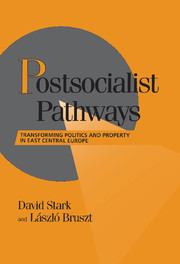Chapter 4 - Markets, States, and Deliberative Associations
from Part III - Deliberative Association
Summary
EAST MEETS EAST
Liberalism has not abandoned its plans for the liberation of the economies of the once-socialist world, but the thrill is gone. Although only the most naive had promised quick fixes back in 1989 and 1990, no one foresaw that declines in production would be deeper or last longer than during the Great Depression of the interwar years. Although economic recovery started in some of the East Central European countries as early as 1994, the heady heydays are gone, with electorates fatigued by years of reform. New governments in Poland and Hungary promise to keep their ships on the liberal course - but with socialist colors on the mainsails. Elsewhere in the region, the liberal enthusiasm ended almost before it started. If you were marking off the days on Alexander Shatalin's program to create a mature market economy for Russia in “500 days,” you could have stopped before you had to sharpen your pencil. Yegor Gaidar's program of shock therapy went up with the smoke billowing from the burning parliament building, and Jeffrey Sachs surrendered hope that his advice would be heeded by the Russian government. The market shock, he argued, was halted before the therapy could take effect and will remain unfinished business so long as the political climate and the will of the Russian leadership fail to match the ambitions of his policy prescriptions.
Although the neoliberals are packing their bags, the postsocialist economies will not lack foreign imports: Another group of policy advisers is flying into the region, bringing in their briefcases not lessons from the West but new models from the East. Whereas during the neoliberal heyday consultants commuted directly from Cambridge to Crakow, now it seems that the preferred route reaches Budapest via Beijing, Slovenia via Seoul, and Tallinn via Taipei. If the East European patients (or their international lending agency insurers) were willing to pay for shock therapy, they are likely consumers as well of miracle cures — this time of the East Asian Miracle model.
As the policy winds shift from West to East, the new contingent of policy advisers carries a different message. Free market liberalism, they argue, places its hopes on a self-generating market. But that strategy confuses goals and means. To create markets, one cannot rely on markets.
- Type
- Chapter
- Information
- Postsocialist Pathways , pp. 109 - 136Publisher: Cambridge University PressPrint publication year: 1998



